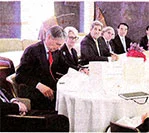UNFOUNDED FEAR: Even with the ultimate deterrent. Teheran is unlikely to trigger a Mid-East arms race
IN this article I will answer three questions with regard to the Iranian nuclear issue.
FIRST, what are the reasons for Iran wanting nuclear weapons?
SECOND, what threats perceived by Iran are contributing to its nuclear goal?
THREE, what are the international security implications of Iran becoming a nuclear state?
As this article goes to press, the negotiations between Iran and the P5+1 – the United States, the United Kingdom, France, China and Russia (the five permanent members of the United Nations Security Council) and Germany – are due to be concluded soon.
Negotiators are pressing Teheran to freeze key elements of its uranium-enrichment cycle – which can be used to produce nuclear warheads – in return for easing sanctions that have crippled the Iranian economy.
If everything goes well, sanctions on Iran may soon be lifted and that deal will turn out to be the single most lasting foreign policy achievement of President Barack Obama’s eight years in the White House and, even without any final agreement, the framework of the deal has somehow recalibrated the balance of power in the Middle East.
But in a speech broadcast on state television on Tuesday, Ayatollah Ali Khamenei insisted that Iran would only dismantle its nuclear infrastructure if economic sanctions were lifted first, and he ruled out halting sensitive nuclear research and development work for the 10 years agreed under the outline plan.
Some analysts believe that such a deal is unlikely to succeed because technical details have yet to be defined and Iran will not get relief from sanctions before the end of the year in the best of cases.
At the same time, Iran does not appear to be halting its march toward nuclear weapons capability. There is also little sign of domestic debate, as Iranians – regardless of their position as conservatives or liberals, hardliners or reformists on the political spectrum – appear to agree that when it comes to threats to national security, Iran should have the means to defend itself.
Despite attempts lasting more than a decade to resolve the issue, Iran has yet to make significant concessions on its nuclear programme.
The New York Times reported on June 1 that Teheran’s stockpile of nuclear fuel had increased by 20 per cent over the past 18 months. That would deem nonsensical the Obama administration’s contention that Iran had frozen its enrichment operations for the duration of the negotiations.
Iran is almost unique in being in a very strategic and sensitive geographical location. Therefore, the uncooperative and often belligerent stance that it adopts towards the rest of the world needs to be understood in light of Iran’s position as a strategically positioned country.
At the same time, national pride runs deep among Iranians, as the country has been an active centre of cultural, scientific, religious and political thought for many centuries.
The “nuclear Iran” is a way for the country to affirm to itself and the world that it is an advanced and sovereign nation.
The motivation behind Iran’s nuclear weapons programme, therefore, should be understood in terms of regime preservation and a deterrent against regional powers, such as Israel’s nuclear power. If Iran crosses the nuclear threshold, deterrence will apply, even if the Iranian arsenal is relatively smaller than Israel’s.
Some scholars, such as Kenneth Waltz, believe claims that Iran’s nuclear programme poses a direct threat to the entire region and constitutes a major source and incentive for nuclear proliferation across the Middle East are an unfounded fear.
When Israel built its first nuclear weapon in December 1966, it was at war with many Arab countries. Its nuclear arms were a much bigger threat to the Arab world than Iran’s programme is today. If a nuclear Israel did not trigger an arms race then, there is no reason a nuclear Iran should now.
For that reason, the US and its allies need not take such pains to prevent the Iranians from developing ‘a nuclear weapon. Diplomacy between Iran and the major powers should continue because open lines of communication will make the Western countries feel better able to live with a nuclear Iran. But, the current sanctions on Iran should be lifted as they primarily harm ordinary Iranians, not the state, and have little purpose.
Punishing a state through economic sanctions does not derail its nuclear programme. North Korea, for example, succeeded in building its weapons, despite countless rounds of sanctions and resolutions by the United Nations Security Council.
If Teheran determines that its security depends on possessing nuclear weapons, sanctions are unlikely to change its mind.
In fact, adding more sanctions now could make Iran feel even more vulnerable, giving it more reason to seek protection of the ultimate deterrent.
Article by Dr Abdul Wahed Jalal Nori which appeared in New Straits Times, 30 June 2015.





